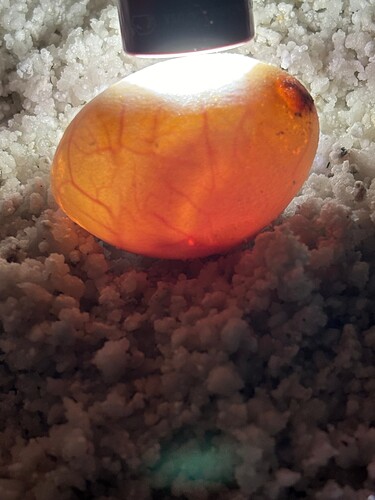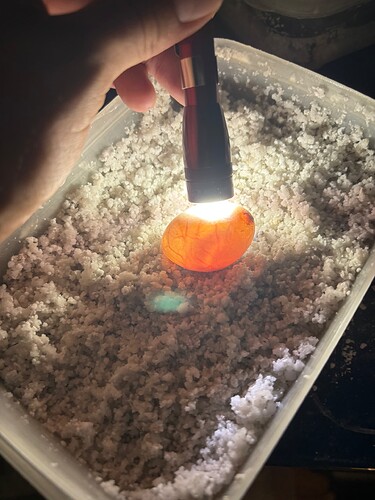Hi everyone, I’m a new breeder with my first clutch and they in their reptibator at 79-81 degrees with 90% humidity. Now, I noticed that there was a fluctuation of temps for several minutes that dipped to 78/79 and rose to 84. My question is, can this fluctuation affect the embryos in the eggs? I assumed that slight fluctuations would naturally happen in the wild, but I want to make sure the are going to be ok. Any knowledge from experienced folks are so welcome. Have a great weekend yawl.
Between those temperatures, no. Once you get over 85 or below 70, then you start getting into dangerous territory. Some people use incubators, others will incubate at room temp (I know @solarserpents uses that method), and obviously in the wild they’re laid and left. However I will ask, are you using the reptibator itself to measure temperature and humidity, or do you have secondary monitoring as well? If you don’t, it’s always a good idea to have a probe inside the incubator with the eggs as well (if not have the whole thing on a thermostat) and to check humidity regularly to be sure nothing is too wet/dry.
Hi there, thank you so much for this amazing piece of knowledge. I have a zoomed thermometer and hydrometer in the actual container keeping the eggs to ensure the temps are reading accurately. I feel so relieved knowing the temps are okay for them. Thank you again ![]()
Hello, @miosoti25. I’m not sure what species you’re incubating, but if they’re corn snakes, you’re totally fine. Nature does indeed vary, and the temperatures within the range you cited are well within what’s acceptable. @noodlehaus is quite correct (as usual) about the danger zones. Even if your temperatures were a bit too high or low for a short time, everything should still be fine. It takes time for the eggs themselves to change temperature. A brief time when the air temperature was too high or too low doesn’t necessarily spell disaster.
I am one of those who incubate in a small room at ambient temperatures. There is some variance from daytime through night. This occurs in nature, of course. Temperature fluctuations within the acceptable range for incubation are not a problem at all.
Good luck with your clutch. What were the parents?
Oops forgot to name the species. Yup they are my cornsnakes and I can’t contain my excitement. Thank you so much for the wonderful knowledge, I truly appreciate it. I hope you have a wonderful day.
ive also got some concerns about my egg (it was the only one viable as she laid the rest in her water bowl instead of her nest box), this is also my first clutch as well and I have been reading that room temps are ok, however my room fluctuates gradually about 8 degrees throughout the day 78 at night and 86/87 at the peak and the eggs were June 18th and the previous hatch date I had was 7/18-21. I was just concerned if this will harm the egg, it still has veins and does not have any mold or smell bad but I did notice that it did start to sag bit
Add images here
Add images here
Remember that temps fluctuate in nature as well. 86/87 is a bit warm, but if it’s not staying that warm for long, it should be good. When was it laid?
It was played on may 18th I figured that too its just very nerve racking and the egg doesn’t smell or have any mold I’ve also red it will take longer as well.
Since you’re incubating at room temperature, it may take longer for them to hatch. 55 days is just a benchmark, I incubate in an incubator with tighter parameters near 82ºF and I don’t expect my clutch to hatch until around day 63.
By “sagging” do you mean the eggshell is beginning to dent inwards?
no the egg looks normal for the most part like no dimpling or deflating just the bottom of the egg started to bulge and sag like something was sitting there and pushing it out so I was thinking maybe the baby snake started actually forming
The baby snake has been forming all along. The “sagging” you describe could possibly be due to the eggshell thinning as hatching time nears. The baby inside absorbs a great many nutrients from the shell in the final days. This has the double purpose of aiding the baby’s development and also making the shell easier to cut through for pipping and hatching. That’s the only thing I can think of which would cause a change in shape.
I’ve had eggs with thin spots in the shell that end up bulging out. Even if they were fertile to begin with, sometimes the thin spot is just too large and they end up dying. But it’s not related to temps. In any case, I would just keep incubating it like normal. It doesn’t look bad to me in the photo.

